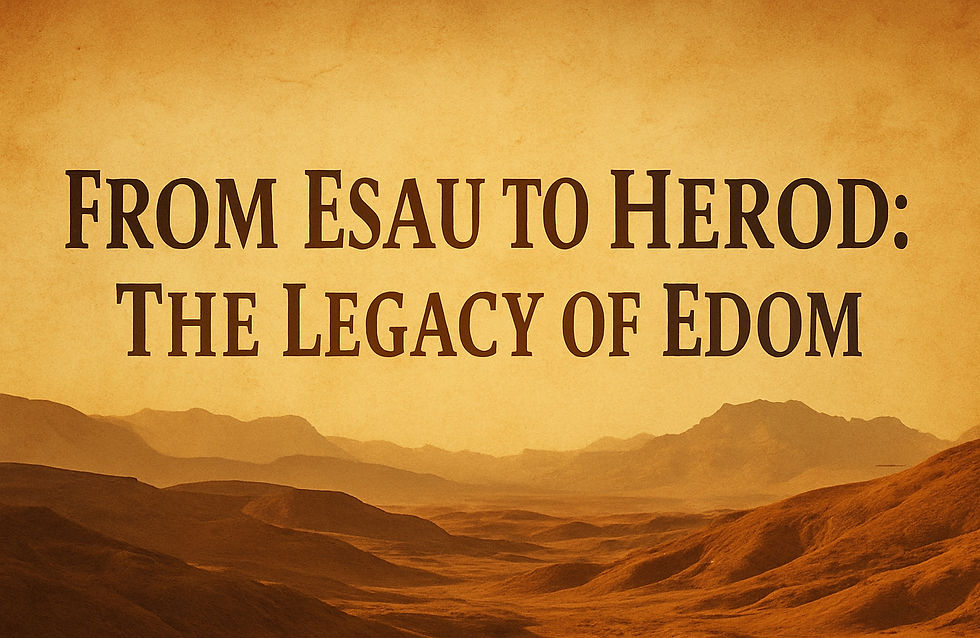From Esau to Herod: The Legacy of Edom
- Bible Believing Christian

- Sep 4, 2025
- 3 min read

From Esau to Herod: The Legacy of Edom
The story of Esau, the twin brother of Jacob, is not a footnote in the biblical narrative. His descendants, known as the Edomites, echo across the pages of Scripture, colliding with Israel’s history again and again. By the time of the New Testament, this ancient rivalry culminates in a shocking figure: King Herod the Great, the Idumean ruler of Judea, whose bloody paranoia sought to destroy the newborn Messiah. To trace this line is to see how choices, nations, and enmity endure across centuries—and how God’s purposes are never thwarted.
Biblical Foundations: Esau and Edom
Esau, the firstborn son of Isaac and Rebekah, was marked from the womb as part of a divine struggle:
“But the children struggled together within her; and she said, ‘If it is so, why am I in this condition?’ So she went to inquire of the Lord. And the Lord said to her, ‘Two nations are in your womb; And two peoples will be separated from your body; And one people will be stronger than the other; And the older will serve the younger.’” (Genesis 25:22–23, NASB)
Esau’s descendants became the nation of Edom, named for his nickname Edom (אֱדוֹם, ’Edom), meaning “red.” From Genesis through the Prophets, Edom is cast as a brother-turned-enemy of Israel. The rivalry is not only familial but national, with Edom often opposing Israel’s advance (Numbers 20:14–21) and later rejoicing over Jerusalem’s destruction (Obadiah 1:10–14).
New Testament Insights: From Edom to Herod
Edom had been conquered by the Maccabees (c. 125 BC) and forcibly converted to Judaism. From that assimilation came the Idumeans—the Greek form of “Edomites.” One family rose to prominence: the Herodian dynasty.
Herod the Great, appointed by Rome as king of Judea, was an Idumean by ancestry, not a son of David. This made his reign both politically expedient for Rome and theologically problematic for Israel. The man who ordered the slaughter of Bethlehem’s infants (Matthew 2:16) was the living embodiment of Esau’s opposition to Jacob—Edom’s hand against Israel, even as the Messiah was born.
Thus, when Herod tried to kill the Christ, the rivalry of the womb reappeared in full force. The Edomite king attempted to stamp out the true King of the Jews—Jacob’s greater Son, the one through whom God’s promises to Israel would be fulfilled.
Theological and Historical Notes
Early interpreters did not miss the symbolism. The church father Jerome noted that Edom’s constant hostility toward Israel prefigured the opposition of worldly powers to the church. Augustine went further, seeing Herod’s fury as the climax of Edom’s enmity, setting himself against Christ, the true heir.
Rabbinic writings also recognized Edom as an enduring symbol of opposition, later equating Edom with Rome itself. Thus, the Edomite line—biological and symbolic—became shorthand for the enemies of God’s people.
Misconceptions
A common misconception is that Herod was a Jew by heritage. In reality, his family was Idumean (Edomite), converted under compulsion. This distinction matters because it fulfills the prophecy that “the older will serve the younger.” Herod’s crown could not erase the fact that he was not of Jacob’s line, and his paranoia about losing power revealed the insecurity of his illegitimate claim.
Another misconception is that Edom’s story ended in the Old Testament. In truth, Edom’s legacy reached its peak in the New Testament through Herod, proving that God’s prophetic word endures across centuries.
Why This Matters
Tracing Esau to Herod shows us the long arc of God’s sovereignty. Nations rise and fall, brothers feud, dynasties clash—but God’s promises remain. The Messiah came despite Herod’s violence, just as Jacob prevailed despite Esau’s rage. For modern believers, this history reminds us that worldly powers, no matter how hostile or entrenched, cannot cancel the purposes of God.
Conclusion
From Esau selling his birthright for a bowl of stew to Herod trying to kill the Child born in Bethlehem, the story of Edom is one of misplaced priorities and violent opposition. Yet the true King—descended from Jacob, not Esau—prevailed. In Christ, the rivalry of the womb reaches its resolution: God’s covenant faithfulness to Israel culminates in a Savior who cannot be overthrown. The lesson is clear: what God has promised, He will accomplish—no matter the opposition.


